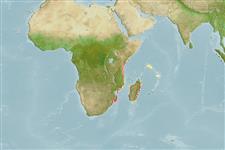>
Centrarchiformes (Basses) >
Oplegnathidae (Knifejaws)
Etymology: Oplegnathus: Greek, hoplon = weapon + Greek, gnathos = jaw (Ref. 45335).
Eponymy: Peão Lopes of the Lourenco Marques Museum was described as “…a most able collector and technician”. He collected eight of the records of fishes in or near Delagoa Bay that Smith discussed in his paper, presumably including the knifejaw holotype. (Ref. 128868), visit book page.
More on author: Smith.
Environment: milieu / climate zone / depth range / distribution range
Ekologi
marina revassocierade; djupintervall 20 - 130 m. Tropical
Western Indian Ocean: Delagoa Bay in Mozambique northwards (Ref. 4387), but the northern limit of its range in not known (Ref. 9660).
Size / Vikt / Age
Maturity: Lm ? range ? - ? cm
Max length : 75.0 cm TL hane/ej könsbestämd; (Ref. 9660); common length : 50.0 cm TL hane/ej könsbestämd; (Ref. 9660)
Short description
Bestämningsnycklar | Morfologi | Morfometri
Taggstrålar i ryggfenan (totalt) : 11; Mjukstrålar i ryggfenan (totalt) : 20 - 21; Taggstrålar i analfenan: 3; Mjukstrålar i analfenan: 16. Adults dark bronzy brown in color.
Inhabits reef areas and feeds on benthic invertebrates.
Life cycle and mating behavior
Könsmognad | Reproduktion | Lek | Ägg | Fecundity | Larver
Heemstra, P.C., 1984. Oplegnathidae. In W. Fischer and G. Bianchi (eds.) FAO species identification sheets for fishery purposes. Western Indian Ocean (Fishing area 51). Vol. 3, FAO, Rome. (Ref. 9660)
IUCN Red List Status (Ref. 130435: Version 2024-2)
Threat to humans
Harmless
Human uses
Fiskeri: kommersiell
Verktyg
Special reports
Download XML
Internet-källor
Estimates based on models
Preferred temperature (Ref.
123201): 22.9 - 26.6, mean 25.6 °C (based on 16 cells).
Phylogenetic diversity index (Ref.
82804): PD
50 = 0.5156 [Uniqueness, from 0.5 = low to 2.0 = high].
Bayesian length-weight: a=0.01995 (0.00906 - 0.04395), b=3.01 (2.83 - 3.19), in cm total length, based on all LWR estimates for this body shape (Ref.
93245).
Trofisk nivå (Ref.
69278): 3.5 ±0.37 se; based on food items.
Fishing Vulnerability (Ref.
59153): Moderate to high vulnerability (50 of 100).
